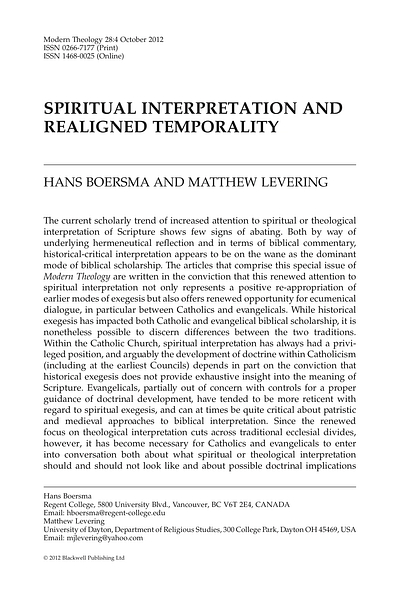Modern Theology 28:4 October 2012
The current scholarly trend of increased attention to spiritual or theological interpretation of Scripture shows few signs of abating. Both by way of underlying hermeneutical reflection and in terms of biblical commentary, historical-critical interpretation appears to be on the wane as the dominant mode of biblical scholarship. The articles that comprise this special issue of Modern Theology are written in the conviction that this renewed attention to spiritual interpretation not only represents a positive re-appropriation of earlier modes of exegesis but also offers renewed opportunity for ecumenical dialogue, in particular between Catholics and evangelicals. While historical exegesis has impacted both Catholic and evangelical biblical scholarship, it is nonetheless possible to discern differences between the two traditions. Within the Catholic Church, spiritual interpretation has always had a privileged position, and arguably the development of doctrine within Catholicism (including at the earliest Councils) depends in part on the conviction that historical exegesis does not provide exhaustive insight into the meaning of Scripture. Evangelicals, partially out of concern with controls for a proper guidance of doctrinal development, have tended to be more reticent with regard to spiritual exegesis, and can at times be quite critical about patristic and medieval approaches to biblical interpretation. Since the renewed focus on theological interpretation cuts across traditional ecclesial divides, however, it has become necessary for Catholics and evangelicals to enter into conversation both about what spiritual or theological interpretation should and should not look like and about possible doctrinal implications that this renewed focus may have for the relationship between Catholics and evangelicals.
Download


